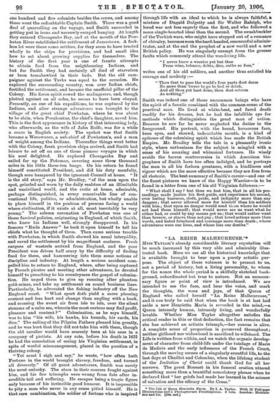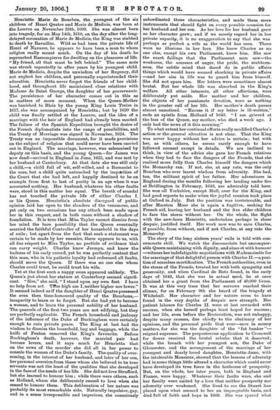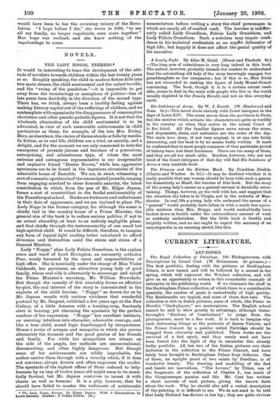"LA. REINE MALHEUREUSE."*
Miss TAYLOR'S already considerable literary reputation will be much increased by this very able and admirably illus- trated book. Here we see all the historical knowledge that is available brought to bear upon a purely artistic pur- pose. The object of these volumes is to present to us, not a period of history, but a living personality, to whom for the nonce the whole period is a Skilfully sketched back- ground, subordinated but true to nature. Not an unneces- sary figure or point of view is introduced. We are intended to see the face, and hear the voice, and mark the thoughts, the woes and joys, of that Queen of England who called herself "La Reins Malheureuse," and it can truly be said that when the book is at last laid aside a new Henrietta Maria is recorded in the mind,—a Queen intensely human, intensely living, and wonderfully lovable. Whether Miss Taylor altogether satisfies the critical reader in this or that deduction, the fact remains that she has achieved an artistic triumph,,—her canvas is alive. A complete sense of proportion is preserved throughout; neither girlhood nor widowhood is sacrificed to wifehood. The Life is written from within, and we watch the organic develop- ment of character from child-life under the tutelage of Marie de Medicis and the early influences of the French Court, through the moving scenes of a singularly eventful life, to the last days at Chaillot and Colombe,s, when the lifelong student of the Imitation of Christ could thank God for all her sorrows. The great Bossuet in his funeral oration uttered something more than a beautiful consolatory phrase when he declared that "her griefs had made her learned in the science of salvation and the efficacy of the Cross."
* The Life of Queen Henrietta Maria. By I. A. Taylor. With 32 Full-page Illustrations and 2 Photogravure Frontispieces. 2 vols. London Hutchin- son and Co: [248. net] Henrietta Marie de Bourbon, the youngest of the six children of Henri Quatre and Marie de Medicis, was born at the, Louvre on November 25th, 1609. She was almost born into tragedy, for on May 14th, 1610, on the day after the long- delayed coronation of Marie de Medicis, the King was stabbed to death by Ravaillac. Wild as had been the private life of Henri of Navarre, he appears to have been a man to whom religion really meant much. On the day of his death he reproached Bassompierre for dwelling on the pleasures of life. "My friend, all that must be left behind." The same note was struck repeatedly in after years by his yonngest child. Marie de Medic's, despite the unwisdom of her Regency, did not neglect her children, and personally superintended their education. Henrietta never forgot the friends of her child- hood, and throughout life maintained close relations with Madame de Saint George, the daughter of her gouvernante. The persistence of her character conies out in this as in matters of more moment. When the Queen-Mother was banished to Blois by the young King Louis Treize in 1617, she was accompanied by Henrietta ; but by 1620 the child was finally settled at the Louvre, and the idea of a marriage with the heir of England had already been mooted. The failure of the Spanish Expedition brought the desire of the French diplomatists into the range of possibilities, and the Treaty of Marriage was signed in November, 1624. The Treaty was an impossible document, for it made provisions on the subject of religion that could never have been carried out in England. The marriage, however, was solemnised by deputy on this basis, and the young Queen—for James was now dead—arrived in England in June, 1625, and was met by her husband at Canterbury. At that date she was still only a child,—a child full of wit, self-willed, and a Romanist to the core, but a child quite untouched by the impurities of the Court that she had left, and happily destined to be an example from first to last of purity in an age when it was accounted nothing. Her husband, whatever his other faults were, stood in this matter her equal. The breath of scandal has not touched the private life of either Charles I. or his Queen. Henrietta's absolute disregard of public opinion laid her open to the slanders of the venomous, and yet only on two occasions has any attack been made upon her in this respect, and in both cases without a shadow of foundation. It is true that Miss Taylor cannot dismiss from her mind the bare possibility that the Queen eventually married the faithful Controller of her household in the days of exile ; but apart from the fact that such a statement was certain to be made by her enemies, there appears tons, with all due respect to Miss Taylor, no particle of evidence that can carry weight. Charles knew Jermyn, and knew the badness of his early record, yet he was perfectly content that this man, who in his pathetic loyalty had redeemed all faults, should serve the Queen. If there was no one else whom Charles could trust, he could trust his wife.
Yet at the first such a happy issue appeared unlikely. The Queen's jest about her stature at Canterbury seemed signifi- cant. "Sire," she said, "I stand upon my own feet. I have no help from art. Titus high am I, neither higher nor lower." It seemed indeed as if the daughter of Henri Quatre possessed the even then time-honoured quality of the Bourbons,— incapacity to learn or to forget. But she had yet to become a woman, and to learn the personal nobility of her husband. The quarrels of the first two years are not edifying, but they are perfectly explicable. The French household and jealousy of the influence of the Duke of Buckingham were certainly enough to ruin private peace. The King at last had the wisdom to dismiss the household, bag and baggage, while the knife of Fenton removed the King's favourite. Before Buckingham's death, however, the married pair had become lovers, and it says much for Henrietta that on the news of the murder she did all in her power to console the women of the Duke's family. The quality of over- coming, in the interest of her husband, and later of her son, her personal aversion from those whom she believed to be true servants was not the least of the qualities that she developed in the face of the needs of her life. She did not love Strafford, but she learned to honour him ; while there were others, such as Holland, whom she deliberately ceased to love when she ceased to honour them. This deliberation of her nature was probably its most remarkable side. Naturally impulsive, gay, and in a sense irresponsible and imperious, she consciously subordinated these characteristics, and made them mere instruments that should fight on every possible occasion for her husband and her son. As her love for her husband grew so her character grew; and if we merely regard her in her private capacity, it is no exaggeration to say that she was perhaps as perfect a wife as the world has seen. There were no illusions in her love. She knew Charles as no one else, except his own Parliament, knew him. She saw the exact failings that the Parliament men saw—the weakness, the accesses of anger, the pride, the stubborn- ness, the subtle mind that dared do in public affairs things which would have seemed shocking in private affairs —and her aim in life was to guard him from himself. She did not spare him. Her letters were sometimes almost brutal. But her whole life was absorbed in the King's welfare. All other interests, all other affections, were deliberately put aside. Her mother and her children, the objects of her passionate devotion, were as nothing in the greater call of her life. Her mother's death passes almost unnoticed. "Excuse it if my letter is ill-written," ends an epistle from Holland of 1643. "I am grieved at the loss of the Queen, my mother, who died a week ago. I only had the news of it this morning."
To what extent her continual efforts really modified Charles's action or the general situation is not clear. That the King was never happy without her advice is certain ; but with her, as with others, he seems rarely enough to have followed counsel except in details. We are inclined to think, in view of the advice she gave her French relatives when they had to face the dangers of the Fronde, that she realised more fully than Charles himself the dangers which the Monarchy ran. If not, she, at any rate, was the only Bourbon who ever learnt wisdom from adversity. She had, too, the militant spirit of her father. Her adventures in England during the months following her landing under fire at Bridlington in February, 1643, are admirably told here. She won all Yorkshire, except Hull, over for the King, and had good reports to make when the joyful reunion took place at Oxford in July. But the position was irretrievable, and after Marston Moor she is again a fugitive, seeking for French aid, leaving her husband and the five elder children to face the storm without her. On the whole, the flight with the new-born Henriette, undertaken perhaps in sheer despair, justified itself. Her work now was to save Charles, if possible, from without, and if not Charles, at any rate the Monarchy.
The story of the long sixteen years' exile is told with con- summate skill. We watch the disconsolate but unconquer- able Queen maintaining with dignity, and ahno at with humour —witness her indefatigable negotiations with Mademoiselle for the marriage of that delightful person with Charles II.—a posi- tion of ceaseless mortification. The French authorities, even in the stress of the Fronde, treated her with both sympathy and generosity, and when Cardinal de Retz found, in the early days of 1649, that she was in actual need, he at once obtained her a grant from the Parliament of 40,000 livres. It was at this very time that her sorrows reached their climax, for on February 9th she heard of the tragedy at Whitehall. Her character and her nature seem to have found in the very depths of despair new strength. Her patient labours for Charles II. were at last rewarded with success, when she herself perhaps least hoped for success ; and her life, even before the Restoration, was not unhappy, despite many crosses, due chiefly to the obstinacy of her opinions, and the personal pride that ever—save in money matters, for she was the daughter of the "fat banker "- reigned supreme. The preposterous application to Cromwell for dower received the brutal rebuke that it deserved; while the breach with her youngest son, the Duke of Gloucester, and the arrangement of the marriage of her youngest and dearly loved daughter, Henrietta-Anne, with the intolerable Monsieur, showed that the lessons of adversity had in some things little altered a character which could never have developed its true force in the hothouse of prosperity. But, on the whole, her later years, both in England and France, were happy. Whatever their faults were, she and her family were united by a love that neither prosperity nor adversity ever weakened. She lived to see the Stuart line placed upon what seemed to her an impregnable basis, and died full of faith and hope in 1669. She was spared what would have been to her the crowning misery of the Revo- lution. "I hope before I die," she wrote in 1660, "to see all my family, no longer vagabonds, once more together." Her hope was realised, and she knew nothing of the vagaboUdage to come.




































 Previous page
Previous page